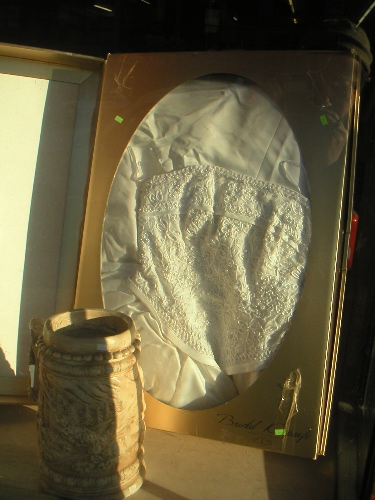The United States Holocaust Museum in Washington currently includes an exhibit on the Nazi persecution of homosexuals, the first in a series on specific groups other than Jews who were victimized by the regime.
The numbers of victims identified with a pink triangle never rivalled those of Jewish victims*, but there was a particular horror awaiting those who managed to survive in the camps until "liberation," and for the world's memory of those who did not survive.
As the Allies swept through Europe to victory over the Nazi regime in early 1945, hundreds of thousands of concentration camp prisoners were liberated. The Allied Military Government of Germany repealed countless laws and decrees. Left unchanged, however, was the 1935 Nazi revision of Paragraph 175. Under the Allied occupation, some homosexuals were forced to serve out their terms of imprisonment regardless of time served in the concentration camps. The Nazi version of Paragraph 175 remained on the books of the Federal Republic of Germany (West Germany) until the law was revised in 1969 to decriminalize homosexual relations between men over the age of 21.
The continued legal and social prohibitions against homosexuality in Germany hindered acknowledgement that homosexuals were victims of Nazi persecution. In June 1956, West Germany's Federal Reparation Law for Victims of National Socialism declared that internment in a concentration camp for homosexuality did not qualify an individual to receive compensation. Homosexuals murdered by the Nazis received their first public commemoration in a May 8, 1985, speech by West German President Richard von Weizsäckerthe fortieth anniversary of the war's end. Four years after reunification in 1990, Germany abolished Paragraph 175. In May 2002, the German parliament completed legislation to pardon all homosexuals convicted under Paragraph 175 during the Nazi era.
Some of this history is current events in the U.S., where "don't ask, don't tell" remains the law of the land, where homosexual activity remains a crime punishable by prison in many states, where there is no federal protection for homosexuals and where gays have always been generously tolerated during wartime but hunted out at other times when seeking careers in military service.
With the reintroduction in 1935 of conscription for all men ages 18 to 45, Germany's homosexual men became liable for service in the armed forces, the Wehrmacht. The German military code did not bar homosexuals, even convicted homosexuals, from serving in the armed forces. As a result, thousands of homosexual men were drafted to serve a regime that persecuted them as civilians.
Homosexual activity in the military was regulated by §175 and §175a. As huge numbers of men were called up, convictions rose, but the longheld fear that homosexuality would spread as an epidemic through the oftenisolated allmale military proved to be unfounded. Still, arrested soldiers faced brutal punishments. Individuals convicted as "incorrigibly homosexual" or for abuse of authority under §175a were discharged, imprisoned, then dispatched to a concentration camp. Those sentenced for having "erred by seduction" served terms in prison and returned to service.
As an option to enduring the notoriously wretched military prisons, men convicted for any but the worst crimes under §175 could petition to join the "cannon-fodder" battalions. Commanders mercilessly used such troops in battles that in most cases were suicide missions.
From its founding the Museum has always been extraordinarily inclusive about the area of its concern, making available materials and literature on the persecution of homosexuals, the handicapped, Gypsies, Poles, Soviet prisoners of war and Jehovah's Witnesses.
The Museum website exhibit, which includes primary source material and photographs, is as excellent as it is horrible.
After it closes in D.C. on March 16, the entire installation travels to New York, San Francisco, other cities and in fact to any additional venues which might still request it (check the site for that information). We were planning a special visit south this winter until hearing the exhibit would be coming here. Actually, as enthusiastic patrons of the Washington Museum, we may decide to travel anyway, take the family, and go back with friends when it gets here.
In any event, the Museum itself should be visited by everyone who possibly can, ideally with some frequency, for the permanent as well as the changing exhibits.
__________
* Umm. When I went to link here to Yad Vashem as a source for the numbers of Jewish victims (usually given as around six million), I failed at first to find a specific figure. While distracted by other information I did notice that wihin the site there are various references to other victims of the Nazis, and that all but one of the usual categories are enumerated specifically. The category of homosexuals is not included. In fact, with further effort, using their own search engine, to locate any reference to homosexual, homosexuality, gay, queer, paragraph 175 or the pink triangle, I only turned up, repeatedly, the answer, "No documents matching your query were found." I was shocked and not a little angry.

